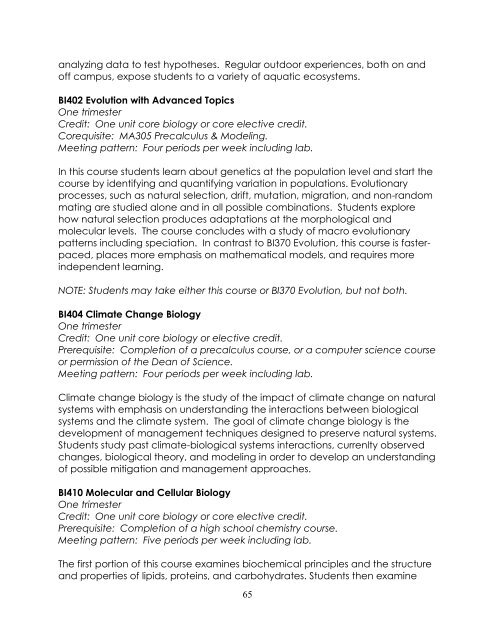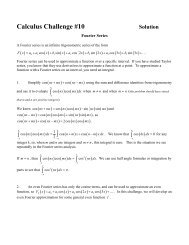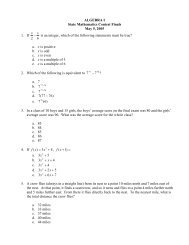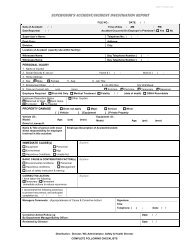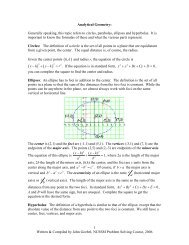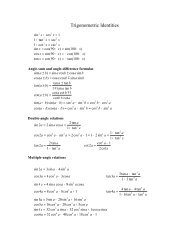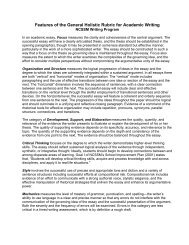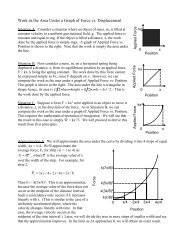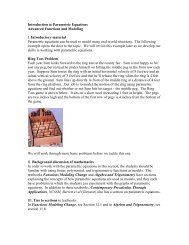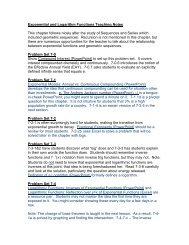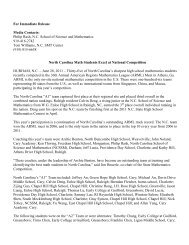NCSSM COURSE CAtAlOG - North Carolina School of Science and ...
NCSSM COURSE CAtAlOG - North Carolina School of Science and ...
NCSSM COURSE CAtAlOG - North Carolina School of Science and ...
You also want an ePaper? Increase the reach of your titles
YUMPU automatically turns print PDFs into web optimized ePapers that Google loves.
analyzing data to test hypotheses. Regular outdoor experiences, both on <strong>and</strong><br />
<strong>of</strong>f campus, expose students to a variety <strong>of</strong> aquatic ecosystems.<br />
BI402 Evolution with Advanced Topics<br />
One trimester<br />
Credit: One unit core biology or core elective credit.<br />
Corequisite: MA305 Precalculus & Modeling.<br />
Meeting pattern: Four periods per week including lab.<br />
In this course students learn about genetics at the population level <strong>and</strong> start the<br />
course by identifying <strong>and</strong> quantifying variation in populations. Evolutionary<br />
processes, such as natural selection, drift, mutation, migration, <strong>and</strong> non-r<strong>and</strong>om<br />
mating are studied alone <strong>and</strong> in all possible combinations. Students explore<br />
how natural selection produces adaptations at the morphological <strong>and</strong><br />
molecular levels. The course concludes with a study <strong>of</strong> macro evolutionary<br />
patterns including speciation. In contrast to BI370 Evolution, this course is fasterpaced,<br />
places more emphasis on mathematical models, <strong>and</strong> requires more<br />
independent learning.<br />
NOTE: Students may take either this course or BI370 Evolution, but not both.<br />
BI404 Climate Change Biology<br />
One trimester<br />
Credit: One unit core biology or elective credit.<br />
Prerequisite: Completion <strong>of</strong> a precalculus course, or a computer science course<br />
or permission <strong>of</strong> the Dean <strong>of</strong> <strong>Science</strong>.<br />
Meeting pattern: Four periods per week including lab.<br />
Climate change biology is the study <strong>of</strong> the impact <strong>of</strong> climate change on natural<br />
systems with emphasis on underst<strong>and</strong>ing the interactions between biological<br />
systems <strong>and</strong> the climate system. The goal <strong>of</strong> climate change biology is the<br />
development <strong>of</strong> management techniques designed to preserve natural systems.<br />
Students study past climate-biological systems interactions, currenlty observed<br />
changes, biological theory, <strong>and</strong> modeling in order to develop an underst<strong>and</strong>ing<br />
<strong>of</strong> possible mitigation <strong>and</strong> management approaches.<br />
BI410 Molecular <strong>and</strong> Cellular Biology<br />
One trimester<br />
Credit: One unit core biology or core elective credit.<br />
Prerequisite: Completion <strong>of</strong> a high school chemistry course.<br />
Meeting pattern: Five periods per week including lab.<br />
The first portion <strong>of</strong> this course examines biochemical principles <strong>and</strong> the structure<br />
<strong>and</strong> properties <strong>of</strong> lipids, proteins, <strong>and</strong> carbohydrates. Students then examine<br />
65


